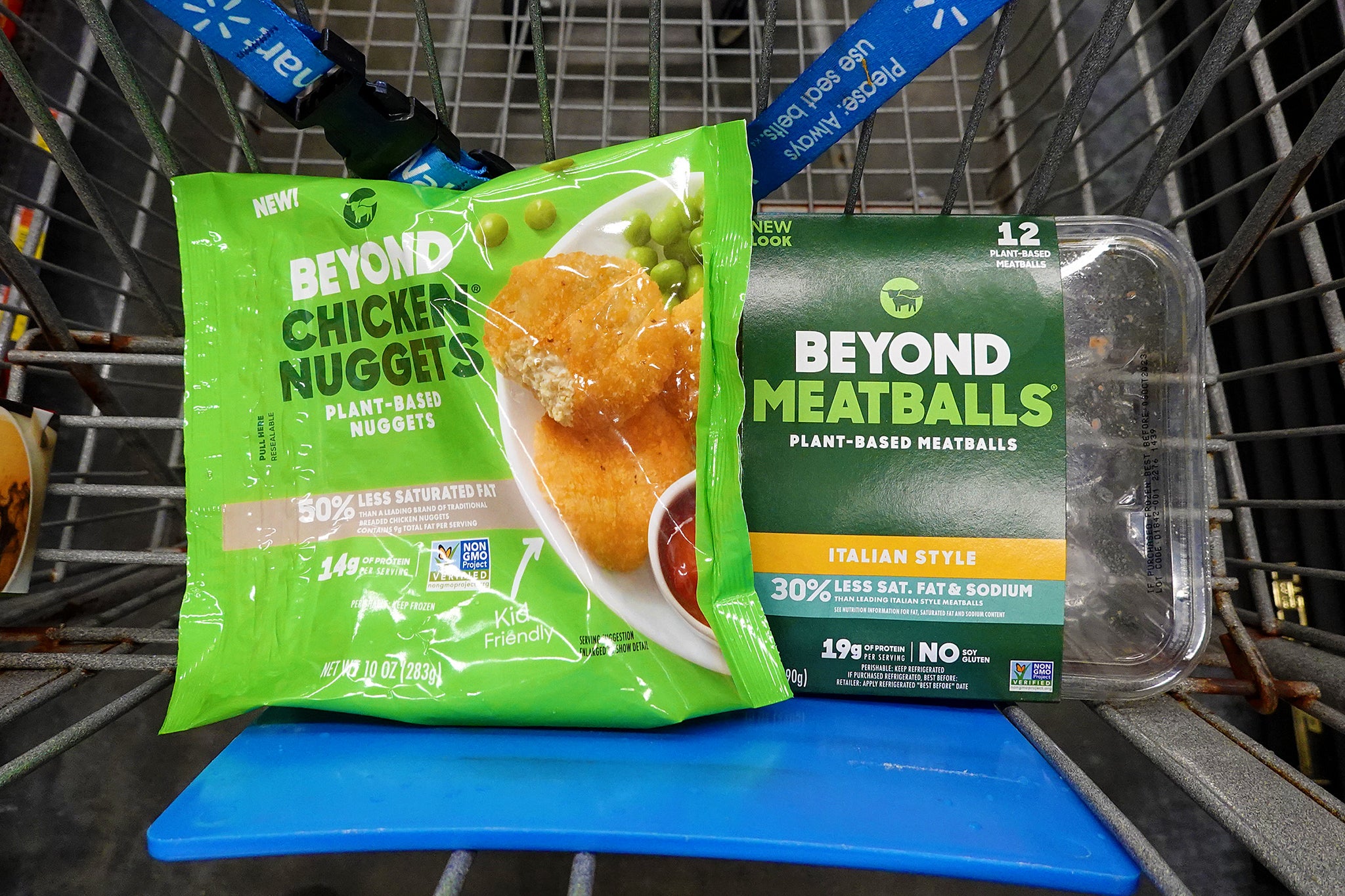Fake meat is dying, but that shouldn’t mean the end of veganism
Sales at the vegan food manufacturer Beyond Meat have plummeted, while brands including Nestlé, Pret and Oatly have cut back on their expensive vegan ranges. The cost-of-living crisis could be to blame, writes Olivia Petter, but veganism’s image problems also run deeper


Has fake meat reached its expiration date? For a while, the vegan food manufacturer Beyond Meat were the hottest thing in food, their faux burgers and sausages so popular that everyone from McDonald’s to Honest Burger began cashing in on those slightly strange-looking pea protein patties. But now their revenue has slipped by a third, and the entire fake meat industry has been spooked.
After it went public in 2019 – when it was valued at more than $10bn – Beyond Meat’s shares shot through the roof. This continued throughout the pandemic, when it was reported that almost one in five Britons were eating more vegan and/or vegetarian food. It seemed as if veganism was taking over the world. But then something changed.
In the past year, the Leeds-based faux meat company Meatless Farm (which provided vegan products to Byron Burgers, Itsu and Pret) went into administration. Pret A Manger has closed half of its dedicated vegetarian and vegan sites. Meanwhile, the Yorkshire-based sausage brand Heck has also reduced its vegan range, cutting it down from 10 products to two. Other brands, including Oatly, Innocent and Nestlé, have also removed vegan products from their ranges in the last year.
On top of all this, vegan restaurants have been struggling, too. The Vurger Co recently appointed administrators, two outposts of London’s Clean Kitchen Club have been closed only 18 months after they opened, and Brixton’s Cafe Van Gogh appealed for support in May after revealing that a drop in customers had led to a threat of potential closure.
The truth, of course, is that the cost of living crisis has forced shoppers to reevaluate their spending. Who wants to invest in a fancy vegan burger (a pack of two Beyond Meat burger patties cost £4 in Tesco) or some dairy-free ice cream when they can barely afford their electricity bill? When cutting costs is the priority, sticking to any kind of diet becomes a little more difficult, particularly when that diet is notoriously expensive to fund.
By and large, veganism is one of the most inaccessible food practices. Or at least that’s how it seems when you walk into a branch of Whole Foods and see rows of £6 chocolate bars and loaves of bread for £15. It turns out that you can really get anything you want in vegan form, whether it’s cheese, tuna, burgers, or even eggs – so long as you’re willing to pay a substantial premium.
And even once you’ve done that, there is simply no end to the number of superfoods you can add to your morning smoothie in order to supplement all of the vitamins you’re neglecting. Nor is there a limit to the dishes on which you can sprinkle some £6.99 chia seeds, or some £4.99 yeast flakes, all of which we’re told are crucial if we’re to adopt a vegan diet. Just ask any of the influencers that will soon flood your Instagram Explore page with recipes and tips the second you start googling anything that includes the words “plant-based”.
I think it could be the concept of eating ‘fake meat’ that is falling out of fashion rather than veganism itself
These were some of the things I found myself getting caught up in when I dabbled in veganism a few years ago. I began wasting hours watching thick-haired, glossy-skinned YouTubers smothering their meals in spirulina and spending absurd amounts of money on niche plant-based products I couldn’t afford, all because it seemed part of the package.
None of this was necessary. All of it was going completely against what a plant-based regime should even involve. A healthy vegan diet needs none of the pomp and pageantry that our capitalist society would have us believe. In fact, a simple vegan meal often comprises the cheapest items on our supermarket shelves, incorporating things like beans, chickpeas and rice with fresh vegetables. There is no need to invest oodles of cash into vegan meat alternatives, many of which are overly processed and devoid of nutritional value.
Still, that’s not the image of veganism we’re being sold. Why? Well, put simply, it’s not as marketable. Do you see anyone out there trying to make a 55p tin of chickpeas sexy? How about a 65p tin of cannellini beans? Or a 50p 1kg bag of carrots? No, of course not. And perhaps that’s part of the problem. By this point, we all know that veganism and vegetarianism are much more eco-friendly diets to adopt than a carnivorous one. Last month, for instance, one study found that vegan diets produce a quarter of the greenhouse gasses of high-meat diets. Researchers from the University of Oxford looking at the eating habits of 55,000 people also found that adopting a plant-based diet had a much lower environmental impact on land use, water pollution risk, water use and biodiversity loss.

So the pull for this way of living is still very much there, at least from an environmental point of view. In fact, you could argue that given the recent reports of extreme weather around the world, it’s more urgent than ever before. And people are still dabbling in it – in February, Veganuary reported more than 700,000 people had taken part in its annual month-long pledge to the diet.
“I think it could be the concept of eating ‘fake meat’ that is falling out of fashion rather than veganism itself,” suggests Marc Summers, founder of vegetarian restaurant Bubala. “It’s always felt like a strange concept to me, trying to imitate meat products instead of focusing on veg themselves and trying to bring out the best in them.”
It doesn’t help that producing vegan meat alternatives is an expensive business, too. “The costs are high and I do feel like it was innovative and new at the time but not something that would sustain demand,” adds Summers, who has always avoided using fake meat products in his dishes, favouring vegetables and other naturally plant-based foods instead.
“Vegan and vegetarian food can be accessible during the cost of living crisis,” he says. “Just look at the veg aisle in your local supermarket instead of processed products. If we are creative with vegetables, there are plenty of ways to create amazing dishes, which are much cheaper than their fake meat counterparts.”
So as Beyond Meat and other plant-based staples continue to slip out of the zeitgeist, perhaps we shouldn’t dismiss veganism altogether and instead reconsider how we approach it. Sure, it might take a little more effort to whip up an interesting meal out of tins of beans and vegetables. But it’s doable – and who knows, if you do it right, you might even save money instead of splurging it.
Join our commenting forum
Join thought-provoking conversations, follow other Independent readers and see their replies
Comments


Bookmark popover
Removed from bookmarks